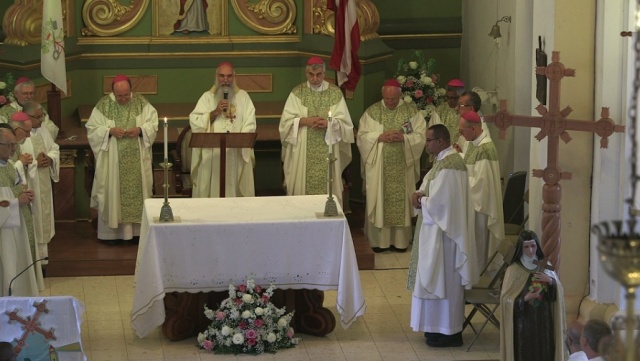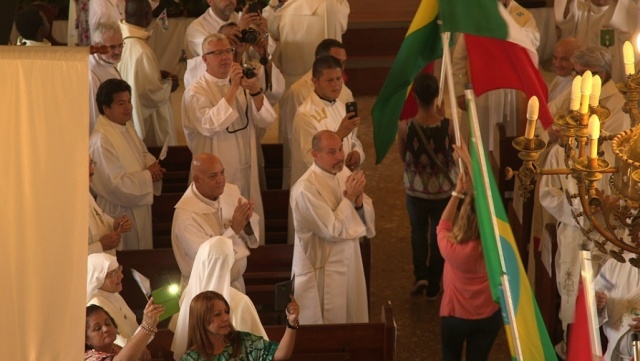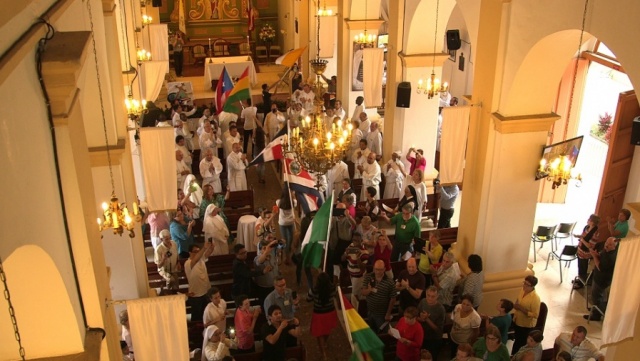"Tres cosas tiene el amor que no se pueden olvidar:
Que Dios nos amó primero, que hay que darse por entero y ponerse a caminar."
(Tres Cosas Tiene el Amor, Fernando Leiva)
Last time, I mentioned a bit of what Pope Francis said during his trip to the World Meeting of Families in 2015. With Puerto Rico so much in the news (let's say a quick prayer for them right now), this week I am remembering a trip to that island a few years ago that reminded me of how much love has to do with Gospel joy.
In 2015 I had the chance to go to Puerto Rico to a missionary symposium in preparation for the
5th Missionary Congress of the Americas, which will take place in Bolivia in 2018. There were over 100 delegates from 23 different countries representing all of Latin America, the Caribbean, Canada and the U.S.
At the closing Mass, the presider (and wonderful)
Most Rev. Ruben Gonzalez Medina, CMF, bishop of the diocese of Cagua in Puerto Rico, reminded us of a popular song by Fernando Leiva that says that love has three things that we cannot forget.
Three things, has love; that cannot be forgotten:
That God loved us first,
that we must give of ourselves totally,
and begin to walk.
I realized then, the (obvious) link between love and the call to mission.

It’s no surprise that Pope Francis has been constantly reminding us that the Gospel is joy. It's no surpirse that his first Apostolic Exhortation is titled,
The Joy of the Gospel (if you haven't read it, you must). It begins,
"The joy of the Gospel fills the hearts and lives of all who encounter Jesus." The Gospel must bring joy, otherwise it is not Gospel, it is not Good News. And if we are truly missionaries, if we are truly evangelisors, it’s because we are joyful. We should be able to tell Christians, by their joy! (If you want to experience the joy of the Gospel, go to Mass in Puerto Rico!)
We are joyful because we are in love. (And therefore, in the words of the old hymn, they will know we are Christians by our love.)
If you have it; share it!
Think of first learning of that new an amazing cure for (insert whatever affliction best applies to your experience). Imagine how you'd feel when you find out that it worked. Imagine how excited you'd be to tell others about it. I have friends who upon acquiring their first car – that cool car they always wanted and worked hard to acquire – couldn’t wait to show it to everyone.
Think of your first love, or when you first met your husband or wife. Didn’t you want to share the news with everyone? Didn’t you want everyone to meet him or her? You were excited and in love.
That is why we share the Good News: because we are in love.
In fact, that is the Good News: That God loves us!
And that is the first thing about love that we must not forget.
Pope Francis made up a word (he does this occasionally, although this could be Argentinean slang, I'm not sure. I apologize to our non-Spanish speakers who will lose something in the translation. Read more
here): “
Primerear.” It is a verb and it means “to first”. You could say that it means to “make first” or to “do first”. When you conjugate the verb in the present participle form, it becomes, “primerear” or “firsting”. It implies that we are the first to do something. This is what God does: He “firsts” us. He puts us first. He makes us first. In Spanish: “Dios nos primerea.”
God loved us first. God loves us first. We are loved first by God. This, we must never forget.
And how does God love us?
God loves us totally. He gives himself totally for and to us. God hands himself over totally to us. And therefore we too must give of ourselves totally.
I’ve spoken about this in terms of
married love. In Marriage, we must strive to give of ourselves totally. It’s absolutely necessary for married love to be total. However, in terms of our call to love as Christians, in the context of sacrifice, we must also think of giving of ourselves without reserve. The difference is that in Marriage we give all of ourselves, emotionally, sexually, intellectually, physically, all our dreams, our fertility, our fears, insecurities, all our baggage; we give it all and in turn, we receive our spouse totally as well.
In Christian loving we don’t have to give all of ourselves as we do in Marriage, but what we give of ourselves, we give totally. And this is easy to do when we are in love with the God who loved us first. It’s easy to do when we are full of joy. In fact, it’s impossible not to do if we are in love and full of joy!
And so we have to give ourselves totally to the other; this we must not forget.
Love is a movement
The third flows naturally from the second: we must begin to walk.
Love is not stagnant. It is movement; love is growth (more on this next week). The minute you stop loving, you stop growing. This is why we refer to revolutions as “movements”. We also refer to those who oppose a movement, “a resistance.” When we are passionate about something we begin a movement. Those who oppose that movement, create a resistance to the movement; they create a resistance to the motion, in essence, to bring it to a stop. We must not resist love.
When we speak about movement, however, we must keep in mind that we don’t just move. We move in a direction. In the case of Christian loving, we move in the direction of God. Love will always move us towards God. If you want to know whether you are living the Christian call to love, reflect on whether you are moving towards God or towards yourself (this is classic Ignatian spirituality. Ignatius refers these as 'movements of the spirit' or 'inner movements').
This is why we walk. This is why the disciples on the road to Emmaus (Luke 24:13-35), as their hearts were burning within them, were “moved” to go. They left everything on the table, food and all, half-eaten, chairs upturned – they even forgot to close the door – and they went!
We begin to walk (and we do so “in haste” – see how Luke 1:39 describes the movement of the Mother of all missionaries) because love compels us to move. Jesus sends us: Go (Matthew 28:19). But even if we were not sent, the mere fact that we are in love and full of joy because we have been loved first and loved totally, would burn in our hearts and compel us to go.
If we love, we must walk; we must go
This we must never forget.

The final Mass of our missionary gathering at the Parish of St. Joseph in the town of Aibonito in Diocese of Cagua in Puerto Rico, was celebrated on October 1st, Feast of St. Therese of Lisieux. The “little flower” St. Therese of the Child Jesus is the Patron Saint of Missions. The prayer after Communion on her feast day reads:
“May the Sacrament we have received, O Lord, kindle in us the force of that love with which St. Therese dedicated herself to you and longed to obtain your mercy for all.”
May the Lord enkindle in our hearts the force of that burning love, that we may go in love, to love, remembering always that God loved us first and gave himself totally to us. Therefore we must give ourselves totally to others and continue to walk. Pope Francis said to the youth in Rio at World Youth Day 2013 that "We go, without fear, to serve". Today I add: We go, without fear,
in love (because love drives out all fear), to serve. We go to share the joy of the Gospel!
Write to me and tell me about your experiences of missionary love and come back
next time so we can continue looking at some myths about love.
-
Photo credit: Wally Tello

Every week, Deacon Pedro takes a particular topic apart, not so much to explore or explain the subject to its fullness, but rather to provide insights that will deepen our understanding of the subject. And don’t worry, at the end of the day he always puts the pieces back together. There are no limits to deaconstructing: Write to him and ask any questions about the faith or Church teaching:
[email protected] @deaconpedrogm
 It’s no surprise that Pope Francis has been constantly reminding us that the Gospel is joy. It's no surpirse that his first Apostolic Exhortation is titled, The Joy of the Gospel (if you haven't read it, you must). It begins, "The joy of the Gospel fills the hearts and lives of all who encounter Jesus." The Gospel must bring joy, otherwise it is not Gospel, it is not Good News. And if we are truly missionaries, if we are truly evangelisors, it’s because we are joyful. We should be able to tell Christians, by their joy! (If you want to experience the joy of the Gospel, go to Mass in Puerto Rico!)
We are joyful because we are in love. (And therefore, in the words of the old hymn, they will know we are Christians by our love.)
It’s no surprise that Pope Francis has been constantly reminding us that the Gospel is joy. It's no surpirse that his first Apostolic Exhortation is titled, The Joy of the Gospel (if you haven't read it, you must). It begins, "The joy of the Gospel fills the hearts and lives of all who encounter Jesus." The Gospel must bring joy, otherwise it is not Gospel, it is not Good News. And if we are truly missionaries, if we are truly evangelisors, it’s because we are joyful. We should be able to tell Christians, by their joy! (If you want to experience the joy of the Gospel, go to Mass in Puerto Rico!)
We are joyful because we are in love. (And therefore, in the words of the old hymn, they will know we are Christians by our love.)
 The final Mass of our missionary gathering at the Parish of St. Joseph in the town of Aibonito in Diocese of Cagua in Puerto Rico, was celebrated on October 1st, Feast of St. Therese of Lisieux. The “little flower” St. Therese of the Child Jesus is the Patron Saint of Missions. The prayer after Communion on her feast day reads:
The final Mass of our missionary gathering at the Parish of St. Joseph in the town of Aibonito in Diocese of Cagua in Puerto Rico, was celebrated on October 1st, Feast of St. Therese of Lisieux. The “little flower” St. Therese of the Child Jesus is the Patron Saint of Missions. The prayer after Communion on her feast day reads:
 Every week, Deacon Pedro takes a particular topic apart, not so much to explore or explain the subject to its fullness, but rather to provide insights that will deepen our understanding of the subject. And don’t worry, at the end of the day he always puts the pieces back together. There are no limits to deaconstructing: Write to him and ask any questions about the faith or Church teaching: [email protected] @deaconpedrogm
Every week, Deacon Pedro takes a particular topic apart, not so much to explore or explain the subject to its fullness, but rather to provide insights that will deepen our understanding of the subject. And don’t worry, at the end of the day he always puts the pieces back together. There are no limits to deaconstructing: Write to him and ask any questions about the faith or Church teaching: [email protected] @deaconpedrogm